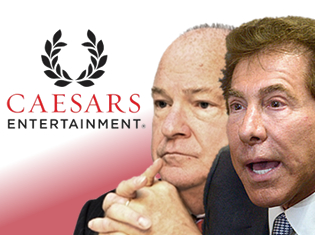 The gloves are officially off in the fight for the lone Boston casino license after Caesars Entertainment made fresh accusations of Massachusetts gaming regulators displaying bias in favor of rival operator Wynn Resorts. In December, Caesars filed a civil suit against the Massachusetts Gaming Commission and its chairman Stephen Crosby (pictured near right), accusing it and him of making false statements about Caesars’ suitability to hold a state gaming license, including questions about Caesars’ connections with a company that allegedly had ties to Russian organized crime members.
The gloves are officially off in the fight for the lone Boston casino license after Caesars Entertainment made fresh accusations of Massachusetts gaming regulators displaying bias in favor of rival operator Wynn Resorts. In December, Caesars filed a civil suit against the Massachusetts Gaming Commission and its chairman Stephen Crosby (pictured near right), accusing it and him of making false statements about Caesars’ suitability to hold a state gaming license, including questions about Caesars’ connections with a company that allegedly had ties to Russian organized crime members.
Rather than be forever saddled with a formal declaration of unsuitability, Caesars withdrew its license application in October, despite having spent an estimated $100m on its Massachusetts bid. The plot thickened after Crosby subsequently disclosed that he had a former business relationship with Paul Lohnes, the owner of the Everett property on which Wynn Resorts hopes to build its casino. Crosby has since recused himself from judging Wynn’s casino proposal, but the move wasn’t enough to smooth out Caesars’ ruffled feathers.
This week saw Caesars amend its lawsuit to accuse Crosby of personally phoning Wynn Resorts chairman Steve Wynn (pictured far right) in October to urge Wynn to stay in the hunt for a Boston area casino. The call was made after Wynn publicly stated that he was considering withdrawing his Boston bid after regulators suggested they would require all state-licensed casino operators to uphold Massachusetts law in all the jurisdictions in which they operate. Unlike Caesars, Wynn has highly lucrative operations in Macau, the world’s largest gambling hub, and choosing between Boston and Macau would be a no-brainer. Caesars claims Crosby personally urged Wynn not to give up on the state so quickly. Caesars’ attorneys claimed CEO Gary Loveman learned of the call via a conversation with Steve Wynn.
In response, Steve Wynn issued a statement calling Caesars’ allegations a “serious misrepresentation.” Wynn acknowledged that he’d received a call from Crosby, but that Crosby was simply returning a call Wynn had placed to the chairman seeking clarification of the Macau situation. Wynn said Crosby told him that “Wynn Resorts, not the Macau SAR, was being licensed and that my company would be required to present responsible business and compliance procedures in order to be licensed.” Wynn called Caesars out for its “shameless, desperate attempt … to deflect attention from the serious issues raised in their investigation, including their current financial condition.” Caesars is struggling under a $24b debt load, the highest in the industry.
Commission spokesperson Elaine Driscoll also took offense at Caesars’ “baseless” allegations, describing them as “nothing more than the act of a disappointed party who withdrew from the lawful licensing process.” Driscoll said the commission remained “confident that we will prevail” in the legal tiff.
WHEN YOU ASSUME, YOU MAKE AN ASS OUT OF U AND ME AND GARY LOVEMAN
Caesars also amended its claims regarding the Spectrum Gaming Group, the company tasked by the Commission with assessing Caesars’ suitability for a state gaming license. Originally, Caesars claimed that Spectrum had recommended that Caesars be found suitable, a recommendation Caesars accused Crosby and the Commission of ignoring. This claim was subsequently denied by Spectrum, which said it hadn’t made a recommendation either way, and that its investigation had only identified “certain specified issues” that Caesars would be required to explain at a later adjudicatory hearing.
Caesars’ amended complaint cites a phone call between Spectrum managing director Fred Gushin and Caesars VP of government relations David Satz in which Gushin used “language that Satz recognized when Spectrum was advising a favorable recommendation.” Satz therefore concluded that Spectrum “had found no reason to conclude that [Caesars] was unsuitable.” Wonder if Loveman later used language that Satz would recognize as profanity for having made such an erroneous conclusion.






